- Home
- Kathy Reichs
Bones of the Lost Page 15
Bones of the Lost Read online
Page 15
Very quickly, my eyes grew heavy. My mind refused to focus.
Thinking food and a little exercise might reinvigorate me, I set out for the DFAC.
Forty minutes and an epic salad later, I rounded the corner of my B-hut row. My pulse quickened at the sight of a pink paper wedged into the doorjamb of my unit. I hurried forward, hoping it was a note from Katy.
It was.
Can’t believe you’re here. Awesome! Off with unit today, tomorrow. Meet tomorrow night. Lighthouse Coffeehouse. 10 pm. (Too late for you, old lady? Tee hee!) No comments on my hair.
Katy
Yes!
With a lighter heart and renewed energy, I returned to the file.
FIRST I REVIEWED the naval criminal investigative service Summary of Incident report. Skimming the boilerplate, I focused on the salient facts.
A cordon-and-knock operation in Sheyn Bagh led to a firefight during which two unarmed Afghan civilians were fatally shot. The shooter was Second Lieutenant John Gross. Gross radioed his BDA to company HQ, and upon return to FOB Delaram reported in greater detail to his company commander, Captain Wayne Hightower.
I had to think for a minute. Recalled from my work at JPAC that BDA meant battle damage assessment.
Hightower ordered Gunnery Sergeant Werner Sharp to interview all participants and reported the incident to battalion HQ. Interviewees told Sharp that the drive to Sheyn Bagh had taken thirty minutes. The convoy of five Humvees and one seven-ton armored truck arrived at sunset. Two of the Humvees were augmented with M2 .50-caliber heavy machine guns. Though historically a friendly village, intel had reported probable weapons caches and explosives stores. The platoon was on high alert.
Sheyn Bagh was bordered on three sides by a wall and on the fourth by a steep hill. The front wall had two gaps for passage from the road to the village, one at each end.
I glanced at the NCIS photos. The place looked like a scene from a Ray Bradbury novel.
Back to the summary.
Light was fading. Three Humvees pulled inside the compound, and two set up outside the wall, one near each opening. The seven-ton positioned between them.
Fire teams from second and third squads began banging on doors and rousting occupants, starting at opposite ends and working toward the middle. First squad deployed to protect the vehicles and to provide covering fire to the searchers.
Lieutenant Gross, armed with an M16 and an M9 Beretta, remained in front to command the operation and to provide additional covering fire. Gross directed Corporal Grant Eggers, a SAW gunner with first squad, to also remain at the front with his light machine gun.
The first house entered was near the end closest to the lieutenant. Two AFG males were taken outside and ordered to remain in place. The searchers found nothing and advanced to an adjoining house. At that moment an explosion rocked the area next to one of the Humvees. The explosion sounded like an RPG. Two marines near the Humvee were hit.
Automatic-rifle fire from the hillside began kicking up dirt at the front of the compound. Lieutenant Gross screamed “contact front” and “engage, engage.” He yelled to the Ma Deuce gunners to sweep the hillside. They tore up the hill and Eggers unleashed several bursts from his M249. Eggers at that point heard cries of “Allah Akbar” from his right and heard the lieutenant open fire. He turned and saw the two LNs from the first house twitching and staggering at an angle between the lieutenant and the house, in a direction away from where the RPG had hit.
The shorthand was all coming back. AFG was for Afghan and LN meant local national.
When Eggers saw the LNs, they were fifteen to twenty meters from the lieutenant, spinning sideways from the impact of the rounds. As they collapsed facedown, Lieutenant Gross ejected the clip from his M16 and jammed in another. Eggers turned to fire more bursts at the hill, but no enemy returned fire. The .50-cal gunners were still raking the hillside. Lieutenant Gross yelled to cease fire, and it got quiet.
Lieutenant Gross ordered everyone back to their vehicles and he and the medic moved to the wounded. Eggers checked the two LNs and both were dead. He did a cursory search and found no weapons or explosives on or near the bodies.
The medic declared the wounded stable but in need of medical attention. Deciding transport by vehicle would be quicker than waiting for a medevac chopper, Lieutenant Gross aborted the mission, had the wounded loaded into the seven-ton, and sped back to Delaram. The dead Afghans were left for the villagers to deal with.
I stopped reading to stand and stretch, and to contemplate what chaotic hell those minutes must have been. Then I turned to the gunny’s assessment of the facts. Basically, Sharp had found the following.
Only Gross and Eggers saw the Afghans get shot, and Eggers did not see the first several seconds. Initially, the two were cooperative and nonthreatening. Only Gross and Eggers heard the men yell anything. Gross claimed the Afghans rushed him. Only Gross shot at them. It was undisputed that the men were unarmed.
The gunny paid particular attention to the statement given by Eggers, and summarized it in some detail:
Eggers was upset and thought both LNs had been shot in the back. Thought they were running from the RPG blast, not toward Gross. Why empty a 30-round clip at these guys? The hostile fire was coming from the hillside. Eggers thought he recognized the younger LN from prior sweeps of the vil. The kid had seemed friendly. Villagers had told him that bad guys would infiltrate the vil, fire at patrols, then melt away. Eggers was sure the dead were noncombatants.
I read the statement by the company commander, Wayne Hightower, but learned nothing new. A file note by an NCIS special agent quoted Hightower as saying he did not intend to play Captain Medina to Gross’s Lieutenant Calley, and that he’d made a full report to his superiors.
From the statement by battalion commander Lieutenant Colonel Walter Roberts, I learned that Roberts had informed the commanding officer of RCT 6, Colonel Craig Andrews. Roberts had also transferred Lieutenant Gross from command of his platoon to a staff assignment at battalion H&S Company. Headquarters and support. Roberts commented that the Gross case had the potential to develop into a major incident at the governmental level. He recommended that the inquiry proceed “by the book.”
I read a directive from Andrews that the Gross matter be referred to the NCIS field office for an investigation into possible felony charges.
I got up for a stretch and shoulder roll. Then I turned to the NCIS scene investigation file.
Two things struck me immediately. First, the file was remarkably thin for an incident potentially leading to felony charges. Second, the special agent directing the scene investigation had not been Blanton. Somehow, that gave me more confidence.
As I worked my way through, I understood why the file was so sparse. By the time an NCIS site visit could be arranged, there was little to inspect. The bodies had been buried and the scene had been cleaned, then trampled by normal day-to-day activity.
One village elder produced thirty M16 shell casings and pointed out the area from which they’d been retrieved. The investigative team photographed damage to the wall where the RPG had landed, collected metal fragments blown from the Humvee, took telescopic photos of pockmarking on the hillside, and dug a handful of .50-cal slugs from the soft rock.
NCIS interpreters conducted interviews, but no one had witnessed the actual shooting. Everyone questioned told the same story. The dead were good men. No insurgents in village. No explosives. No bad weapons, just rifles for protection against thieves. Insurgents on the hill had come, then gone. Marines killed boy. Very bad thing.
Permission for an exhumation was repeatedly denied. With no bodies and no witnesses, that left only the scene examination report and statements from members of Gross’s platoon.
Distilling the statements of the marines and the NCIS investigation down to the basics, a couple of facts stood out. One, the two witnesses to the shooting told conflicting stories. Two, rounds had struck the LNs either in the front or in the back.
I understoo
d the importance of the exhumation. Wondered what Gross was thinking. Clearly he knew.
Perhaps because Eggers had no stake in the outcome, his statement carried enough weight to compel Colonel Andrews to prefer charges against Gross for murder and for conduct unbecoming an officer.
Yep, I thought, murder surely is unbecoming.
I read the DD Form 458s, the military charge sheets. The first identified the accused as Second Lieutenant John Gross, and alleged violations of the UCMJ Article 118 and UCMJ Article 133.
The specifications under 118 read: “That in Sheyn Bagh, Helmand Province, Republic of Afghanistan, the accused did unlawfully murder one Ahmad Ali Aqsaee, an Afghan national by shooting him multiple times with an M16 automatic weapon.” It provided the time and date of the incident.
The specification under 133 referred to the same time and place but alleged that the accused engaged in conduct unbecoming an officer in unlawfully shooting said Ahmad Ali Aqsaee.
The second 458 alleged identical offenses as to one Abdul Khalik Rasekh. Both forms were signed by Colonel Andrews.
The chronology showed that after Colonel Andrews preferred charges, RCT 6 rotated back to Camp Lejeune, North Carolina, home of the Second Marine Division.
Once at Lejeune, Colonel Andrews appointed Lieutenant Colonel Frank Keever as Article 32 investigating officer and detailed Major Christopher Nelson as government counsel and Major Joseph Hawthorn as counsel for the accused.
Lieutenant Colonel Keever called the Article 32 hearing into session two months after RCT 6 returned to Lejeune. The file contained a transcript of the proceedings. I skimmed through it.
Hawthorn made a motion for continuance until an exhumation could be performed. Nelson objected, saying no exhumation was likely. There was discussion, after which Keever denied the motion.
The government’s first witness was Grant Eggers, now out of the military. His testimony seemed in agreement with the statements he’d made to Gunny Sharp and the NCIS special agents.
To satisfy my curiosity, I read the portion of Hawthorn’s cross-examination dealing with Eggers’s motivation in accusing Gross.
Hawthorn: You’re a civilian?
Eggers: Yes, sir.
Hawthorn: Is the reason you did not re-up the fact that Lt. Gross gave you a poor performance evaluation and told you that he would oppose your promotion to sergeant?
Eggers: No, sir. He did tell me that, but it was not the reason I did not reenlist.
Hawthorn: He demoted you, didn’t he?
Eggers: No, sir. He reassigned me from fire team leader to SAW gunner, but I still had the same rank and pay.
Hawthorn: No one else in your platoon said they’d seen the LNs shot in the back, did they?
Eggers: No one else was in a position to see it.
Hawthorn: Did you actually see rounds strike those men in their backs?
Eggers: That’s how it appeared to me, sir. They were being spun around by the impact of the bullets, but it looked like they were hit in the back.
Hawthorn: Would you describe Lt. Gross as a liar?
Eggers: Generally, no. But he has a lot at stake here.
The second government witness was Donald Drew, one of the NCIS special agents who’d examined the scene and interviewed marines. He testified an entire day, but added little.
The government concluded with testimony from three platoon members who said there had been an intense firefight during which they felt in peril, but that the fire came from the hillside, not from the area of the houses.
With that, the government rested.
The following morning, Major Hawthorn informed Keever that he’d received word that the Afghans had decided to let an exhumation go forward, and made a motion that the hearing be recessed pending an autopsy. After lengthy discussion, Keever reversed himself and agreed to a sixty-day recess, during which Hawthorn was to provide regular updates. Should an exhumation and autopsy be completed sooner, the hearing would resume immediately. Keever declared the hearing in recess.
I turned to the final document in the dossier, a handwritten page that appeared to have been torn from a journal.
And my interest level leapt.
The journal entry was written by the man himself.
July 15. 1142 AFT
Got into the shit last night. Ambushed on a cordon and knock. AK fire raining down. Usual Muj spray and pray shooting. Burn a lot of ammo, forget about aim.
We didn’t know what to expect in Sheyn Bagh. Patrols had taken heat in the area, harassment by ambushes and IEDs. Intel had it weapons and explosives were stored in the vil. Our mission was to surprise the LNs at dusk, take the stuff before they used it on us.
We swept in, set up and began to toss the place. Adrenaline was pumping, and my guys were wired. The LNs didn’t greet us with love.
We’d searched a couple houses when an RPG exploded. Two of my guys yelled they were hit. Rounds started peppering down from the hillside. AKs for sure. I ordered my men to take cover and return fire.
For a while the scene was all noise, streaming tracers, and flying debris. BA was no hits from the AKs, two WIAs from the RPG. No EKIAs or EWIAs. Two collateral KIAs in the vil. Our fire. Yours truly the shooter.
I paused for more alphabetic decryption. BA was battle assessment. KIA and WIA were easy—killed in action, wounded in action. I decided EK and EW referred to enemy casualties.
I see it every time I close my eyes. Two Muj rushing me, screaming about Allah. Only seconds to react. I figured the fucksticks were wired to blow. Gave them their tickets for the A train to martyrdom.
The hillside snipers went apeshit, but we had fire superiority. Eventually they shot their wad and disappeared.
WTF? The search found nothing strapped to the dead Muj. Couldn’t have known that. Bedlam. Rounds hitting everywhere. Split second choice. Easy decision. My ass over theirs.
I keep replaying it in my head. What did I hear? What did I see?
Gunfire. Shouting. Some wannabe martyr yelling Allah Akbar. Two LNs in disdahas rushing straight at me. Shit. You have to lay them flat.
Who knows what the assholes intended? I ordered them to stop. They kept coming. I made sure the sorry bastards went down and stayed down. Emptied my clip.
Eggers had my six when the shitstorm started. Why the fuck didn’t he turn his M-249 on the two coming at me? No big surprise. The guy’s a train wreck.
While the Muj hauled ass, Doc and I checked the guys who were hit. They’d taken shrapnel, but could travel. We loaded them into the 7-ton, along with Doc and one fire team, and took off for Delaram.
Eggers is blowing smoke. Shortly before Sheyn Bagh, I had to shitcan him from fire team leader down to SAW gunner. He argued, but I told him my mind was made up.
How many warnings does the jackass deserve before he gets someone killed? Piss poor inspections before taking his squad on patrol. Failures to properly search and secure areas under his responsibility. Improper deployments of his fire team in action. Guy’s a fuckup waiting to happen.
Yesterday Eggers proved me right. His failure to take decisive action could have cost me my ass. If those Muj had been packing, I’d be going home in a box.
It’s not like I wanted to waste those guys. Jesus. I’m practically puking about it. But it was a righteous kill. They were a clear threat.
Eggers doesn’t get it. Doesn’t think like a Marine. Or act like a Marine. CIVCAS from a mission sucks. But collateral damage is part of war.
I don’t trust Eggers and he doesn’t like me.
THE MH-60 BLACKHAWK lifted off, then banked low between shale and limestone cliffs on the start of its three-hundred-mile run to Sheyn Bagh.
That was my best guess of the distance. Welsted had tried to fill me in, but between the throb of the rotors and the wind whooshing against the airframe, conversation wasn’t happening. And lip-reading isn’t one of my skills.
It was early, just past 0600, but after a bad night’s sleep I was ready to move.
Wall-to-wall nightmares. Katy’s voice calling from darkness amid the thud of artillery shells. Birdie purring from the bottom of a deep well. Other scenarios, equally bizarre. The same images looping over and over.
I’d dressed in the predawn darkness, then bolted for a quick breakfast. After donning my IBA, I’d rendez-voused with Blanton and Welsted at the flight line.
The Blackhawk was a marvel of military engineering. Fourteen million dollars’ worth of bulletproof steel and Lexan glass, powered by a pair of massive turboshaft engines.
We were sharing the bird with a half dozen soldiers. Stoic faces, intense eyes. Packed in like badass sardines in a tin. Welsted said they were going someplace north of Sheyn Bagh to quell a disturbance. She didn’t elaborate and I didn’t press.
The Blackhawk elevated at dizzying speed and hurtled toward our destination. The sun rose along the curve of the earth, throwing up spikes of early-morning light. The land was beautiful, the way Artic tundra can be beautiful. A narrow river looked like a dark ribbon twisting across the arid emptiness.
My gaze shifted to Welsted, then to Blanton. Something in their posture indicated a deep mutual dislike. When their eyes met they immediately jumped elsewhere, like magnets repulsing. The air between them crackled with pent-up tension.
I’d sensed the friction yesterday but couldn’t pinpoint the source. Only an insistent tickle at the base of my brain stem telling me that something was off.
Did they have opposing views on the exhumation? Were they unhappy about being ordered into danger in a village of potentially hostile Muslims? Or was it personal?
Forget it. Focus on the task at hand.
I glanced out the Blackhawk’s side window. The bulletproof glass was scarred with milky slashes where antiaircraft rounds had hit and ricocheted off. I charted the terrain below, wondered if anyone had us in his sights.
Concentrated on putting that out of my mind, too.
Thanks to a strong tailwind, we arrived at Delaram early, just before 0800. The Blackhawk’s blades whipped up fans of yellow dust as we touched down. Blanton disembarked first, followed by the soldiers. All scuttled across the landing zone with heads lowered, shoulders hunched to the wind.

 Two Nights
Two Nights The Bone Collection: Four Novellas
The Bone Collection: Four Novellas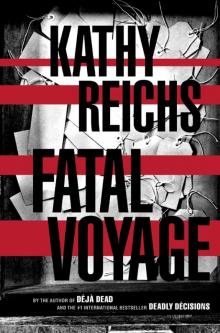 Fatal Voyage
Fatal Voyage 206 Bones
206 Bones Bones to Ashes
Bones to Ashes Terminal
Terminal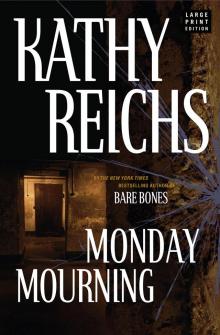 Monday Mourning
Monday Mourning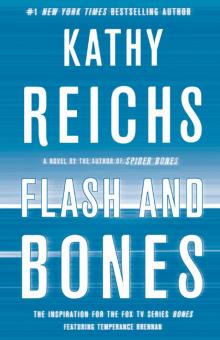 Flash and Bones
Flash and Bones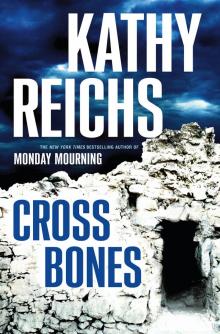 Cross Bones
Cross Bones Devil Bones
Devil Bones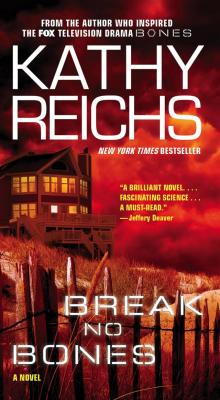 Break No Bones
Break No Bones Swamp Bones
Swamp Bones Déjà Dead
Déjà Dead Shock
Shock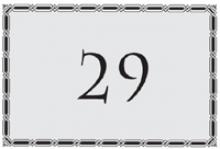 Spider Bones
Spider Bones Death Du Jour
Death Du Jour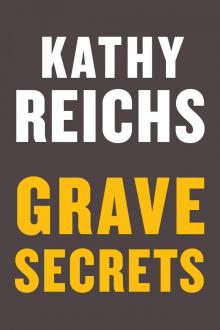 Grave Secrets
Grave Secrets Trace Evidence: A Virals Short Story Collection
Trace Evidence: A Virals Short Story Collection Bones on Ice
Bones on Ice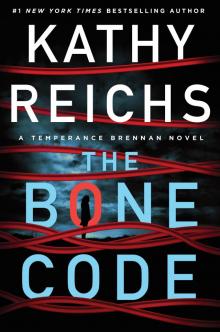 The Bone Code
The Bone Code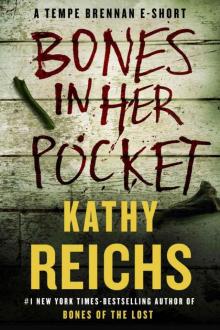 Bones in Her Pocket
Bones in Her Pocket Seizure:
Seizure: Speaking in Bones
Speaking in Bones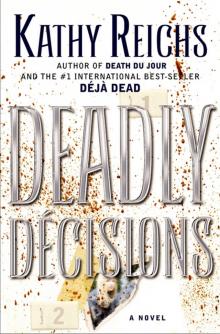 Deadly Decisions
Deadly Decisions Spike
Spike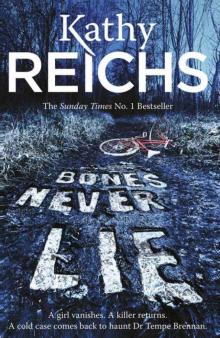 Bones Never Lie
Bones Never Lie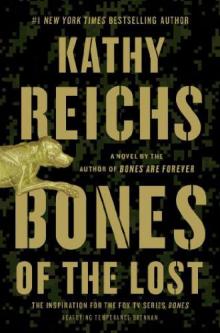 Bones of the Lost
Bones of the Lost Virals 03.5 - Swipe
Virals 03.5 - Swipe Exposure
Exposure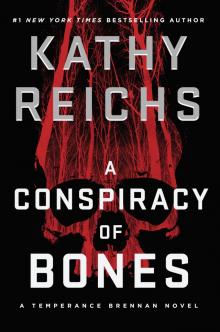 A Conspiracy of Bones
A Conspiracy of Bones Shift (tory brennan)
Shift (tory brennan) Bones of the Lost: A Temperance Brennan Novel tb-16
Bones of the Lost: A Temperance Brennan Novel tb-16 Virals tb-1
Virals tb-1 Bones Are Forever tb-15
Bones Are Forever tb-15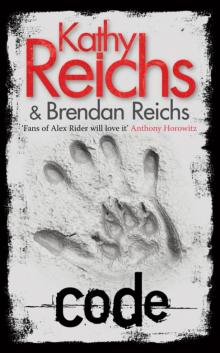 Code tb-3
Code tb-3 Seizure tb-2
Seizure tb-2 Deadly Descisions
Deadly Descisions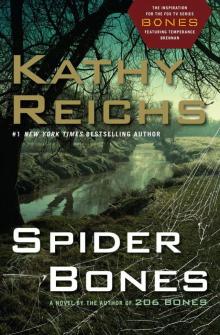 Spider Bones: A Novel
Spider Bones: A Novel